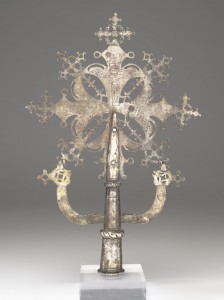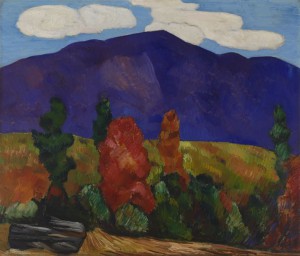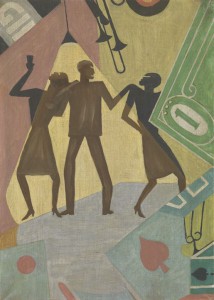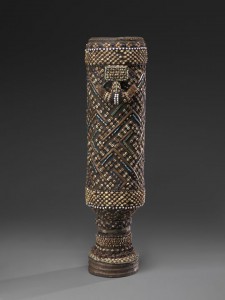VMFA is fortunate to have endowed private funds which can only be used for art acquisition. Here are some recent

Processional Cross, 17th–18th century, Ethiopia, silver, 14¾ in. high. Gift of Robert and Nancy Nooter
acquisitions currently on view in the galleries. The curators have provided insights about the objects. Elaborate processional crosses made for Ethiopian churches are often inscribed with images and lettering that deepen their message. On this ornate work, Mary, crowned Queen of Heaven, holds the Christ child, while archangels Gabriel and Michael stand guard on the cross’s side arms. A second figure on the left arm possibly represents the donor, who the inscription identifies as Walatta Dengel, stating that she donated the cross to the Monastery of St. Michael, of Damba.
— Richard Woodward, Curator of African Art

Franconia Notch (Mt. Lafayette, Franconia Notch,N.H.), 1930 Marsden Hartley (American, 1877–1943), oil on canvas, 30¼ x 35 in. J. Harwood and Louise B. Cochrane Fund for American Art
Painted by Marsden Hartley on his return to America after an extended stay in Europe, Franconia Notch is a quintessential expression of the leading modernist’s self-proclaimed “Americanness” at a time of growing cultural nationalism. It also marks a critical juncture for the New Englander who (like his artistic hero Paul Cezanne) had long embraced mountains as a persistent motif as well as a spiritual and creative metaphor. Hartley dubbed the enduring and intensely personal associations with such scenes his “mountain madness”; more than one-third of his production consists of such imagery.
— Dr. Sylvia Yount, Chief Curator and Louise B. and J. Harwood Cochrane Curator of American Art
Called the Dean of African American art, Aaron Douglas is

The Prodigal Son, ca. 1927, Aaron Douglas (American, 1899-1979), oil on canvas, 26 x 18½ in. J. Harwood and Louise B. Cochrane Fund for American Art
regarded as the leading visual artist of the Harlem Renaissance, as well as the first black artist to create a distinctive modernist style that connected contemporary African Americans with their African heritage. The Prodigal Son has all the hallmarks of Douglas’s signature approach, while evoking one of his most important collaborations—eight gouache accompaniments to James Weldon Johnson’s God’s Trombones, a collection of free-verse poems inspired by folk sermons of Southern black preachers. The Prodigal Son oil directly relates to this award-winning 1927 publication for which Douglas produced various drawings and paintings, including versions of the same subject in different media.
— Dr. Sylvia Yount, Chief Curator and Louise B. and J. Harwood Cochrane Curator of American Art

Royal Drum, early 20th century, Kuba culture (Democratic Republic of the Congo), wood, leather, copper, raffia cloth, cowries, glass beads, fur. 45¼ in. high. Gift of Kenneth and Bonnie Brown
Drumming is a hallmark of African music, and the Kuba create the most lavish of all African drums. Whereas Kuba musicians usually play drums having only carved decoration, this royal drum is a key symbol of power and wealth made more for show than sound. Patterns fashioned from cowries, beads, and copper elevate this work to that of a regal showpiece intended for display next to the king when he is seated in full regalia upon the throne.
— Richard Woodward, Curator of African Art